- Home
- John Scalzi
THAT WAS THE MILLENIUM THAT WAS Page 2
THAT WAS THE MILLENIUM THAT WAS Read online
Page 2
You can't tell the story of the Mongols without telling the story of Ginghis, a story that reads like the script pitch of a desperate hack screenwriter to a development minion for Roger Corman. Ginghis, pampered son of a clan leader, found his life shattered when his noble father Yesügei was poisoned by the evil Tartars (it was in the Yak's milk!). Abandoned by his clan, Ginghis' family was reduced to eating roots and fish. Ginghis swore, with God as his witness, that he would never be hungry again!
Later, Ginghis would go to claim the woman to whom he was betrothed by his father as a small boy, only to find that she had been kidnapped and ravished by the nefarious Merkit people! Enraged, Ginghis allied himself with an old blood brother of his father, gathered an army together, and crushed those nasty Merkits like the fiancée-ravishing worms they were! While he was away, the Jürkins, supposedly his allies, plundered his lands! Those Jürks! He squashed them too, and killed every member of the clan taller than a wagon axel, leaving only children and Dr. Ruth Westheimer alive!
Thus Ginghis began his conquering ways. It wasn't all murder and pillage, mind you. Ginghis actually had a plan. It had been the old clan system that contributed to his father's death and which kept the Mongol people set against themselves; Ginghis changed all that by scattering the members of conquered clans amongst his troops, and by arranging those troops into divisions that were arranged numerically rather than by clan. Advancement in the army was thus tied to a soldier's loyalty to Ginghis, not to his former clan; soon enough, everyone was sucking up to Ginghis, and of course he liked that just fine.
By 1206, Ginghis and his highly-regimented not-at-all-a-horde horde was ready to kick some serious non-Mongol booty, and off they went. They were almost all on horseback, which gave them exceptional mobility and range, since all the horses needed to eat was the grass they found on the way to clobbering some poor foes. The Mongols also made use of whatever technology they found; they were extremely happy to use a nation's own knowledge against it. Ginghis himself, despite his current reputation for crazed, baby-eating dictatorship, actually took advice rather well. For example, he had planned to turn the whole of northern China into a horse pasture, until it was pointed out to him that it might be better to raise food there and then profit from the taxes and trade. Only after he made that decision did he eat any babies (no, not really).
It was in fact this combination of ruthlessness and adaptability that made the Mongols the invaders to beat -- literally-- this entire millennium. They were smarter, they were meaner, and they could ride circles around you on their little horses. Their empire ultimately reached from China to the Russian steppes.
(And they would have gotten Japan, too, were it not for a fortuitous typhoon that sunk their attacking ships -- the fabled kamikaze, or "divine wind," which would serve as a motivation for Japanese fighter pilots to ram explosives-laden fighter planes into American battleships in WWII. Alas, it was America who ultimately brought death from the skies, but that's another installment, somewhere down the road.)
The Mongol's problem was that they were better at conquering than they were at actual empire ruling; after the death of Ginghis's grandkid Kubla Khan in 1294, it all sort of fell apart. But who cares? When they knocked on the door, and said "Hi! We're the Mongol Horde!" you just knew they weren't selling magazine subscriptions to work their way through college. It was trouble with a capital "T," and that rhymed with "G," and that stood for "Ginghis." That's what it took to be the best invaders of the millennium, and the Mongols had it, with plenty to spare.
Best Plague of The Millennium.
It's The Plague, that funny little infection we like to call the Black Death -- bubonic plague. Other plagues have killed more people more quickly (just this century, in 1918, a mutated swine flu erupted out of Kansas and killed 25 million in just over a year -- proof we should have quarantined Kansas a long time ago), but none have had, shall we say, the same style and impact. The Black Death didn't just kill people, it pretty much killed off Europe. The continent was out of it for a century, as it struggled to get back to the place it was, economically and intellectually, before the plague knocked off a third of the population. That's right, if it weren't for the plague, we might right now be at the technological level where we could all drive our own rocket cars to the moon! Instead, I'm forced to tool around in a 1989 white Escort. Stupid Black Death.
As a point of fact, it should be noted that bubonic plague was just one version of The Plague -- and, as it happens, the least fatal version at that. What we call The Plague is a bacterial infection that takes on several forms. In the bubonic form, symptoms begin with shivering, vomiting, headache, giddiness, intolerance to light; pain in the back and limbs; sleeplessness, apathy, or delirium. In short, nothing to distinguish the disease from the state of your typical college freshman after his first frat party.
But then come the blackened, festering inflammation of the lymph nodes known as "buboes," which no amount of cheap fraternity beer will cause. Unless your frat typically allows a flea-ridden Norway rat to float in the keg. Which they almost never do anymore. From there, it's just a hop, skip and a jump to a massive rise in body temperature, constipation or, alternately and much more grave, diarrhea, and then, you know, death.
Remember, this is the most pleasant version. Worse is the pneumonic plague, in which the victim drowns in his own phlegm and infects everyone around him (bubonic plague is not directly contagious). Even worse than that is the septicemic plague, in which so much of the plague bacillus is dumped into the blood stream that the vessels literally explode. You'd also suffer brain damage, but really, how is that worse than every vein in your body popped open like an over-boiled hot dog? Besides, with septicemic plague, you were dead in a day, anyway. It's not like you were going to use your brain afterwards for a hefty game of Scrabble.
If you were to go back to the 14th Century, easily one of the crappiest centuries around even if you throw out the plague, you'd find that the average European citizen had not the slightest idea of how this plague was getting around. Most chalked it up to God (who as the Old Testament shows us, was always scourging someone or another, because he was God and, darn it, sometimes us humans just really ticked him off) and hid in a barn, never even guessing that it was the fleas that were passing the disease around. If you had suggested that if they took a bath every once in a while it might help, you'd have received a blank stare and then probably would have been held down while the general population had you pressed to death with stones. Everyone knows that bathing removes that protective layer of grime! What, you want to get everyone killed or something?
Even the more learned minds of the era had not a clue. Advisors to the Pope informed His Holiness that the plague had been the result of a conjunction of Saturn, Jupiter and Mars in the sign of Aquarius, back in 1345. This conjunction caused warm, moist conditions that allowed the earth to release poisonous gases; essentially, the plague was a case of planetary halitosis (the irony is that this explanation is not entirely out of left field -- scientists today suspect a strong El Nino effect in the 14th Century contributed to milder winters that allowed for easier transmission of the plague. Saturn, Jupiter and Mars, of course, had little to do with it -- or that's what today's "scientists" would have you believe...). The Pope's advisors suggested avoiding meat, sleeping in the daytime, olive oil, and of course, bathing. Nothing about avoiding rats or their pesky fleas.
In Venice, the plague begun the process of quarantine, named for the number of days (40, for those of you who aren't so handy with the Italian) an incoming ship had to stay isolated, presumably to let the plague burn itself out. Over in Germany, they decided to blame the plague on the Jews, and slaughtered 8,000 of them in the city of Strasbourg alone. The Germans also took to self-flagellation as a way to cleanse their bodies and their souls. The Germans were freaks, particularly since the rest of Europe was going the other direction morally. While the Germans were literally whipping themselves (and the Jews) into a frenzy, ever
yone else was drinking and partying. Eat, drink and be merry, for tomorrow, every one of your blood vessels might explode. It's hard think of a better reason to get down.
At the end of the 14th Century pandemic, 25 million Europeans were dead. It would take 300 years to get the population back up to pre-plague levels (at which time, the plague came around for another bite). The plague took another 10 million or so in China in the late 19th century; all told, plague ate up over 100 million lives this millennium. It's still around, too -- there are a couple thousand cases of the plague worldwide every year, including about a dozen and a half right here in the States (kids, stay away from strange squirrels).
Thanks to such advances as streptomycin, bathing, and the general avoidance of nasty, flea-bearing rodents on a daily basis, the Black Death is not likely to make much of a comeback. But you never know. Right now, Jupiter and Saturn are cozying up to each other just southwest of Taurus; follow the line down, and you'll find Mars, loitering south of Aquila. They're all up there. And that global warming is acting up again. Throw in a vegetarian S&M fetishist with a cat o' nine tails, and the Black Death will be right back in business! Hide in the barn. It's the safe thing to do.
Best Stuffed Toy of The Millennium.
Teddy Bears. Beyond being cute as, well, little tiny stuffed bears, there's also a great story behind how the Teddy Bear got its name. It seems that Teddy Roosevelt was out hunting one day, as that burly, totally manly man did, when he wasn't charging up a hill in Cuba and scaring the hell out of Spaniards, and he came upon a poor, helpless bear cub. A lesser man, say, Ernest Hemingway, would have shot the poor thing and then lied to Gertrude and Alice about how the thing charged him. Because he was covered with honey and salmon. Don't ask.
Not Teddy Roosevelt. Teddy took one look at that wee bear cub, and said, in these exact words (I'm guessing), "Hey, I can't shoot that. It's tiny and defenseless. I will spare its life, and come back when it is bigger and thus able to better defend itself against high-speed chunks of metal, launched explosively from a great distance." Well, word got around how Teddy spared the life of the cub, and a grateful nation, impressed with his wisdom, elected him President and called their little stuffed bears "Teddy Bears" from then on. Although neither of these stopped other people from shooting bear cubs whenever they damn well felt like it.
(Incidentally, Teddy Roosevelt despised being called "Teddy," a fact that might surprise many, but which in fact makes perfect sense. He was President of the United States, after all. He's supposed to have a little dignity. You don't call the leader of the free world by a diminutive. We did that once -- Jimmy Carter -- and look where that got us. Roosevelt's hatred for "Teddy" casts doubt on a second Teddy Roosevelt story about naming the stuffed bears, in which he christens them himself at his daughter's wedding. However, Teddy is responsible for the Maxwell House coffee slogan -- "Good To The Last Drop." That Teddy Roosevelt, he got around.)
From the time of Roosevelt forward, it's hard to think of anyone in the North America or Europe who hasn't had a little stuffed bear at one time of another in his or her life (generally during childhood; the 46-year-old CEO who can't ruthlessly trample a foundering competitor without clutching "Binky Bear" to his Wharton-graduated chest is a rare one indeed). My infant daughter has an even dozen, provided to her at her birth by relatives, friends, and a Kay-Bee Toys whose security was just a little too lax that one day I was short on cash (I'm kidding. It was Toys-R-Us). She's got other stuffed toys, including lions, bunnies, puppies and a vibrating helicopter (it was a gift. I swear). I suspect, however, that none of these will have the staying power of the bears.
Why? At least partially because they have been so popular in the past, and at least as it comes to children's first toys, familiarity breeds success. We all had teddy bears, so our kids will have them too. And of course, there are other nefarious plans at work -- We had to fight to keep Winnie-The-Pooh from metastatizing all over our baby's nursery and becoming a locked-in, just-send-all-your-income-straight-to-Disney theme. Fight, mind you. Now, growing up, we all had other stuffed creatures, too, but none of them have the eternal staying power, the claw hold in cultural memory. Two decades from now, when today's first graders start their cycle of reproduction (Parents: Whatever you do, don't think of your own first-grader reproducing -- on that path lie madness), their children will know nothing about, say, stuffed Pokemons. And, might I add, Thank God.
Anyway, darn it, stuffed baby bears are cuter than any other animal known to man -- so much so that they pose a hazard in real life. Forest rangers are always having to tell people to stay away from bear cubs they might find out there while camping, not so much because of the threat posed by the cub (though if you think about it, your average bear cub is the size of a Rottweiler, and just as much a carnivore), but because wherever a cub might be, a momma bear is sure to follow, weighing half a ton, bearing four-inch claws, and being more than happy to gnaw on your dumb-ass skull if you so much as even breathe in the direction of her darling cub, which of course you've done -- you've had the kids pose next to the thing for a Kodak moment.
It's hard to feel too sorry for these people. Anyone whose brain can't wrap itself around the idea that a wild animal might not be the same complacent stuffed toy they remember from their youth deserves what they get. That's one trait we don't need floating around in the gene pool. Be that as it may, the fact it happens with enough frequency that Fox could fill up an entire hour of television with it ("When Bears Attack Stupid Tourists -- 4!!!") points to the wide-scale influence teddy bears have had. I suppose we ought to be glad Teddy Roosevelt didn't decide to spare the life of a baby Great White.
Best Science Fiction Novel of The Millennium.
Somnium (Dream of a Voyage from the Earth to the Moon). In the book, the hero is launched, with the help of his mother, who has magical powers, to the moon. Here's an excerpt (translated by by computer, with some judicious editing by moi), in which a demonic tour guide (of sorts) describes the precautions necessary for a moon launch, and the effects of weightlessness on the passengers.
"The initial shock is the worst moment, because the traveler is projected as by a powder explosion... It is thus necessary that he is calmed by opiates; arms and legs must be carefully protected so that they are not torn off, and so the effect of the launch is spread in all his body. The passenger will then encounter new difficulties: an extreme cold and difficult breathing...
"After the beginning of the voyage, things become easier, because during a so long voyage, the body undoubtedly escapes the mathematical [read: gravitational] force from the Earth and penetrates that of the Moon, so that the latter takes the top.
"At this point, we release the travelers and leave them to their own means: like spiders, they lengthen and retract, and are propelled by their own forces - because the magnetic forces of the Earth and the Moon attracting the suspended body and it together, the effect is as if there were no attraction - so that at the end its mass will turn of its own accord to the Moon."
I know, you've never read it. That's because it was published just a little before your time. Say, 1634. The author: Johannes Kepler.
Surely you've heard of Johannes Kepler. He was the fellow who, appropriately enough, discovered Kepler's three laws of planetary motion, in which -- everyone sing along, now:
(1) the planets move in elliptical orbits with the Sun at one focus;
(2) the time necessary to traverse any arc of a planetary orbit is proportional to the area of the sector between the central body and that arc;
(3) there is an exact relationship between the squares of the planets' periodic times and the cubes of the radii of their orbits.
Not just the law, but a good idea. Break the laws of planetary motion, and you get a fine, or, alternately, your planet sinks into the hot gaseous bowels of the sun, while you run about, yelling and screaming. Your choice. Hint: Take the fine.
Somnium is a little quaint to read today, but then again, what written
in the early 17th Century isn't? Even Shakespeare comes across as a little twee now and again. But for its time, man, it had everything: Wild, fantastic ideas, a breathtakingly original premise, and, of course, that most important part of any novel's publicity cycle: Controversy. This book was so hot that it couldn't be published in Kepler's lifetime. They waited until Kepler was planted four years before they slipped it onto the shelves.
The controversy regarded the mode of propulsion in the story: Magic, provided by his mother, Katharina Kepler. Nowadays, magic is simply a cheap trick employed by lazy writers who don't want to bother with giving the implausible events in their books a reasonable explaination (we generally call these people "fantasy writers," though they are not the only ones -- every time someone in the "Star Trek" universe discovers a new type of sub-atomic particle to get them out of a scrape at the last moment, it's magic!). But back in the 17th century, if you were thought to know anything about magic, you didn't play birthday parties and bar mitzvahs. You were strung up and tortured until you admitted that, why, yes, you and Satan regularly got together to eat children and do the shag nasty. Was there some sort of problem with that?
Which is in fact what happened to Katharina Kepler: Round about 1619, several years after Somnium was initially completed, Katharina was accused and tried for being a witch. Kepler had to travel to Württemberg to defend his mother -- and the reason she was eventually released had less to do with her innocence (and of course she was innocent; like nearly all women charged with witchcraft, Katharina Kepler was at most a screwy old biddy with some practical knowledge of folk remedies) than with the fact that the authorities didn't follow the correct torture procedures ("You idiot! You were supposed to impale her there, not there! Yeeesh!"). Kepler's use of his mother as a convenient mode of space propulsion was not so very convenient for mom.

 Lock In
Lock In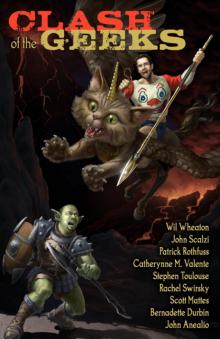 Clash of the Geeks
Clash of the Geeks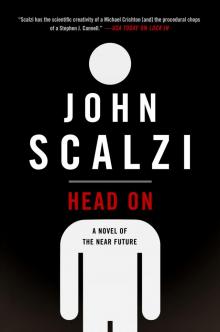 Head On
Head On The Dog King
The Dog King Old Man's War Universe: Short Stories
Old Man's War Universe: Short Stories The End of All Things
The End of All Things Tales From the Clarke
Tales From the Clarke The Human Division
The Human Division The Android's Dream
The Android's Dream An Election
An Election Zoe's Tale
Zoe's Tale Agent to the Stars
Agent to the Stars This Hollow Union
This Hollow Union The Gentle Art of Cracking Heads
The Gentle Art of Cracking Heads Old Man's War
Old Man's War The Tale of the Wicked
The Tale of the Wicked Your Hate Mail Will Be Graded: A Decade of Whatever, 1998-2008
Your Hate Mail Will Be Graded: A Decade of Whatever, 1998-2008 Judge Sn Goes Golfing
Judge Sn Goes Golfing The Back Channel
The Back Channel The Human Division 0.5 - After the Coup
The Human Division 0.5 - After the Coup Fuzzy Nation
Fuzzy Nation The Observers
The Observers This Must Be the Place
This Must Be the Place The Last Colony
The Last Colony Unlocked: An Oral History of Haden's Syndrome
Unlocked: An Oral History of Haden's Syndrome A Voice in the Wilderness
A Voice in the Wilderness Redshirts
Redshirts The Collapsing Empire
The Collapsing Empire The Last Emperox
The Last Emperox The God Engines
The God Engines A Problem of Proportion
A Problem of Proportion THAT WAS THE MILLENIUM THAT WAS
THAT WAS THE MILLENIUM THAT WAS The B-Team
The B-Team The Sound of Rebellion
The Sound of Rebellion The President's Brain Is Missing
The President's Brain Is Missing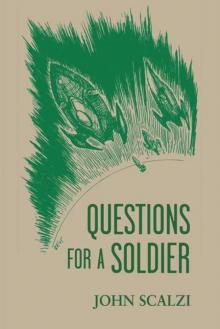 Questions for a Soldier
Questions for a Soldier Walk the Plank
Walk the Plank We Only Need the Heads
We Only Need the Heads How I Proposed to My Wife: An Alien Sex Story
How I Proposed to My Wife: An Alien Sex Story Earth Below, Sky Above
Earth Below, Sky Above Everything but the Squeal
Everything but the Squeal Old Man’s War
Old Man’s War The Human Division #12: The Gentle Art of Cracking Heads
The Human Division #12: The Gentle Art of Cracking Heads This Must Be the Place thd-10
This Must Be the Place thd-10 A Voice in the Wilderness thd-4
A Voice in the Wilderness thd-4 The Observers thd-9
The Observers thd-9 The End of All Things: The Fourth Instalment
The End of All Things: The Fourth Instalment Earth Below, Sky Above thd-13
Earth Below, Sky Above thd-13 Zoe`s Tale вбиос-4
Zoe`s Tale вбиос-4 After the Coup
After the Coup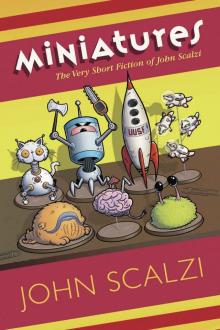 Miniatures: The Very Short Fiction of John Scalzi
Miniatures: The Very Short Fiction of John Scalzi The Last Colony вбиос-3
The Last Colony вбиос-3 Tales From the Clarke thd-5
Tales From the Clarke thd-5 Old Man's War omw-1
Old Man's War omw-1 The Human Division #8: The Sound of Rebellion
The Human Division #8: The Sound of Rebellion The Ghost Brigades omw-2
The Ghost Brigades omw-2 The Sagan Diary (old man's war)
The Sagan Diary (old man's war) The Sound of Rebellion thd-8
The Sound of Rebellion thd-8 The Human Division 13 - Earth Below, Sky Above
The Human Division 13 - Earth Below, Sky Above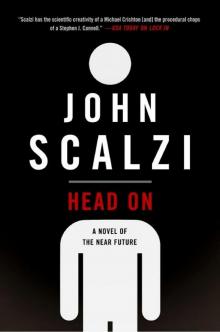 Head On_A Novel of the Near Future
Head On_A Novel of the Near Future The End of All Things: The First Instalment
The End of All Things: The First Instalment The B-Team thd-1
The B-Team thd-1 The Back Channel thd-6
The Back Channel thd-6 Walk the Plank thd-2
Walk the Plank thd-2 The Human Division #9: The Observers
The Human Division #9: The Observers The End of All Things: The Third Instalment
The End of All Things: The Third Instalment The Human Division #10: This Must Be the Place
The Human Division #10: This Must Be the Place The End of All Things #2: This Hollow Union
The End of All Things #2: This Hollow Union We Only Need the Heads thd-3
We Only Need the Heads thd-3 Metatropolis
Metatropolis The Dog King thd-7
The Dog King thd-7 The Consuming Fire (The Interdependency)
The Consuming Fire (The Interdependency) The Human Division #11: A Problem of Proportion
The Human Division #11: A Problem of Proportion